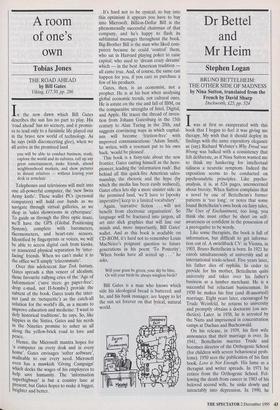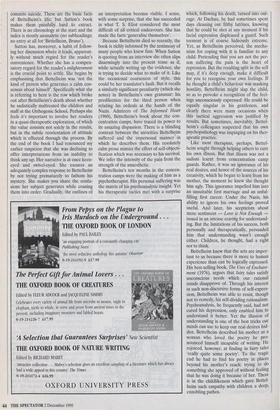Dr Bettel and Mr Helm
Stephen Logan
BRUNO BETTELHEIM: THE OTHER SIDE OF MADNESS by Nina Sutton, translated from the French by David Sharp Duckworth, £25, pp. 524 Iwas at first so exasperated with this book that I began to feel it was giving me therapy. My wish that it should deploy its findings with the same expository elegance as (say) Richard Webster's Why Freud was Wrong was balked with a consistency that felt deliberate, as if Nina Sutton wanted me to think my hankering for intellectual tidiness a neurotic symptom. Indeed the exposition seems to be conducted on psychoanalytic principles. Like psycho- analysis, it is, at 624 pages, unconcerned about brevity. When Sutton complains that a novel by one of Bettelheim's former patients is 'too long', or notes that some found Bettelheim's own book on fairy tales, The Uses of Enchantment, too long, you think she must either be short on self- awareness or confident in the possession of a prerogative to be wordy.
Like some therapists, the book is full of information, but difficult to get informa- tion out of. A switchback CV: in Vienna, in 1903, Bruno Bettelheim is born. In 1921 he enrols simultaneously at university and at international trade-school. Five years later, his father dies of syphilis. In order to provide for his mother, Bettelheim quits university and takes over his father's business as a lumber merchant. He is a successful but reluctant businessman. In 1930 he makes his first (and ill-assorted) marriage. Eight years later, encouraged by Trude Weinfeld, he returns to university and promptly obtains a doctorate (on aes- thetics). Later, in 1938, he is arrested by the Nazis and imprisoned in concentration camps at Dachau and Buchenwald. On his release, in 1939, his first wife announces that their marriage is over. In 1941, Bettelheim marries Trude and becomes director of the Orthogenic School (for children with severe behavioural prob- lems). 1950 sees the publication of his first book, Love is Not Enough. His fame as a therapist and writer spreads. In 1971 he retires from the Orthogenic School. Fol- lowing the death from cancer in 1983 of his beloved second wife, he sinks slowly and intractably into depression. In 1990, he commits suicide. These are the basic facts of Bettelheim's life; but Sutton's book makes them painfully hard to extract. There is no chronology at the start and the index is stoutly unanalytic (no subheadings; no entry at all for `Bettelheim, Bruno').
Sutton has, moreover, a habit of follow- ing her discussion where it leads, apparent- ly without much regard for the reader's convenience. Whether she has a compen- satory regard for the reader's enlightenment is the crucial point to settle. She begins by emphasising that Bettelheim was 'not the kind of person who generates a calm con- sensus about himself. Specifically what she is referring to here is the row which broke out after Bettelheim's death about whether he sadistically maltreated the children and staff at the Orthogenic School. Perhaps she feels it's important to involve her readers in a quasi-therapeutic exploration, of which the value consists not solely in the results, but in the subtle reorientation of attitude which is effected through the process. By the end of the book I had renounced my earlier suspicion that she was declining to offer interpretations from an inability to think any up. Her narrative is at once keen- eyed and swivel-eyed. She ensures an adequately complex response to Bettelheim by not trying prematurely to fathom his mystery. She makes you share the confu- sions her subject generates while coaxing them into order. Gradually, the outlines of an interpretation become visible. I sense, with some surprise, that she has succeeded in what T. S. Eliot considered the most difficult of all critical endeavours. She has made the facts 'generalise themselves'.
Because Bettelheim died so recently, the book is richly informed by the testimony of many people who knew him. When Sutton is quoting from an interview she often slips disarmingly into the present tense as if, while actually writing up the evidence, she is trying to decide what to make of it. Like the occasional coarseness of style, this could be her translator's fault. But it recalls a similarly significant peculiarity (which she notes) in Bettelheim's own grammar: his predilection for the third person when relating his ordeals at the hands of the Nazis. Admirers of The Informed Heart (1960), Bettelheim's book about the con- centration camps, have traced its power to its amazing dispassion. There is a blinding contrast between the atrocities Bettelheim suffered and the impersonal manner in which he describes them. His resolutely calm prose mimics the effort of self-objecti- fication which was necessary to his survival. We infer the intensity of the pain from the strength of the anaesthetic.
Bettelheim's ten months in the concen- tration camps were the making of him as a psychotherapist. His personal suffering was the matrix of his psychoanalytic insight. Yet his therapeutic tactics met with a surprise which, following his death, turned into out- rage. At Dachau, he had sometimes spent days cleaning out filthy latrines, knowing that he could be shot at any moment if his facial expression displeased a guard. Such torment is of course hideously extreme. Yet, as Bettelheim perceived, the mecha- nism for coping with it is familiar to any child. Pretending that you are not the per- son suffering the pain is the heart of repression. But the resulting split in the self may, if it's deep enough, make it difficult for you to recognise your own feelings. If he thought a child's behaviour was masking hostility, Bettelheim might slap the child, so as to provoke a recognition of the feel- ings unconsciously expressed. He could be equally singular in his gentleness, and clearly there were many occasions when this tactical aggression was justified by results. But sometimes, inevitably, Bettel- heim's colleagues suspected that his own psychopathology was impinging on his ther- apeutic practice.
Like most therapists, perhaps, Bettel- heim sought through helping others to cure his own illness. But that illness was not a sadism learnt from concentration camp guards. Rather, it was an ignorance of his real desires, and hence of the sources of his creativity, which he began to learn from his mother, the moment he knew she thought him ugly. This ignorance impelled him into an unsuitable first marriage and an unful- filling first career. Under the Nazis, his ability to ignore his own feelings proved useful. And later, his scepticism about mere sentiment — Love is Not Enough issued in an intense craving for understand- ing. But the limitations of his success, both personally and therapeutically, persuaded him that understanding wasn't enough either. Children, he thought, had a right not to think Bettelheim knew that the arts are impor- tant to us because there is more to human experience than can be logically expressed. His best-selling book, The Uses of Enchant- merit (1976), argues that fairy tales satisfy unconscious needs which our rational minds disapprove of. Through his interest in such non-discursive forms of self-expres- sion, Bettelheim was able to resist, though not to remedy, his self-dividing rationalism. Psychoanalysis, he frequently said, had not cured his depression, only enabled him to understand it better. Yet the illusion of understanding is one of the best tricks our minds can use to keep our real desires hid- den. Bettelheim described his mother as a woman who loved the poetry he pro- nounced himself incapable of writing. He rejoiced, however, at finding in fairy tales `really quite some poetry'. To the tragic end he had to find his poetry in places beyond his mother's reach: trying to do something she approved of without feeling that he was doing it because of her. There is in the childlikeness which gave Bettel- heim such empathy with children a deep, ennobling pathos.











































































 Previous page
Previous page